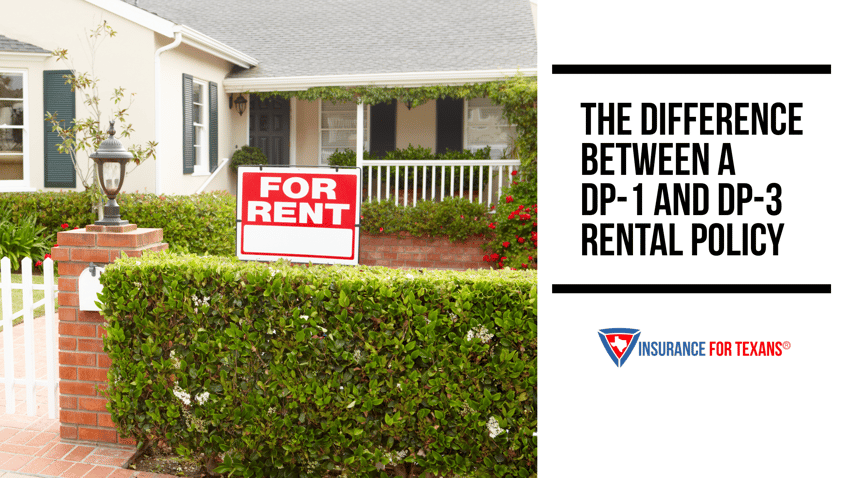Rick is buying his rental property. It's a great little three bedroom, two bath home in Abilene that he is getting a discounted price because of a great wholesaler doing his thing. He has run the numbers and with a little bit of work, he should be able to make it cash flow nicely from a fix and rent standpoint. He is going to do the light cosmetic work himself to save money on the investment end and get it ready for a long term tenant in the next month. The plan is going exactly as he had hoped. Especially for his first property. And then the lender asked him what he is going to do for insurance coverage. He froze when realized that he didn't have a clue what to do and hadn't accounted for the current costs in his cash flow model.
Though landlord insurance is not required in the state of Texas, if you're borrowing money to buy the investment property your lender is going to require you to have some form of insurance to complete the transaction. You, just like Rick, also have to recognize that a regular homeowner's policy for a rental property exposes the owner to risk because a standard homeowner policy will not cover a rental property. No matter what claims are made by you.
Different policy language and cost basis is needed for different occupancy types. The risk of potential property claims is not the same when an owner does not occupy. At Insurance For Texans, we ensure that landlord insurance is in place for all property owners who manage property with the intent to collect rent. Our insurance agent's job is to make sure that Rick and you don't lose your behind while creating wealth through rental income.
What Does Landlord Specific Coverage Do For You?
With ownership of a rental property, you take on more risk by owning a home where you don't dwell. The same common risks of property damage from fire, wind, water, hail and other perils still apply, but now you've added another potential risk . . . people that are not you! This is known to insurance companies as human peril.
Let's face it, sometimes renters do dumb stuff. You may be like Rick and screen all of your tenants to the best of your ability through a management company. But you can't control their behavior, choices and actions, even if your tenants are family members. This is a key difference and why liability coverage is so important to you as the property owner. But beyond the potential for liability suits, these tenants can do some serious to your property. We've seen departing tenants do some nasty stuff, especially if the relationship goes sour. You don't want to wind up with concrete in your pipes and have to pay out of pocket to replace or repair them. This is why we advised Rick to include malicious mischief all perils policy.
When it comes to insurance policies for your rentals, you have options. We see many investors simply seek out the cheapest insurance policy that they can find. And with the inflation pressures hitting everywhere we understand the train of thought. But you need to understand your options to know the best fit and coverage for you and your investment. There can be a massive difference in how potential claims are handled between a basic insurance policy and more comprehensive policies. And while no one likes to pay for insurance policies, they don't care what the cost was when their insurance claim is being paid for swiftly so that they can keep their revenue stream flowing.

Common Insurance Policy Types For Landlords
At the most basic policy form, a dwelling insurance policy (aka Landlord policy) will cover you for eight covered perils that will be listed on the policy documents. This will be known as a DP-1 insurance policy. As you begin to add endorsements, you will eventually scale up to an open perils policy which will be known as a DP-3 insurance policy. We will dig into the details of the DP1 policy and DP3 policy down below.
But before we do that, we need to address one important aspect of dwelling policy insurance. And that is the difference between actual cash value vs. replacement cost value when it comes time to settle a claim against your residential properties.
If your property suffers significant damage, say in the case of a fire, you'll either have a policy with replacement cost or actual cash value as a form of recourse. Full Replacement Cost will allow you to rebuild in the event of a total loss, but will cost a bit more generally speaking. Actual Cash Value can be subject to depreciation when the insurance company writes a check back to you. This will decrease the amount paid in the event of a claim and likely will not allow you to cover a full rebuild. It's not worth trying to save a couple of hundred bucks a year to roll that way. Rick fully understood this when we explained it to him.
Now it's time to look at the differences between DP-1 Insurance and DP-3 Insurance for Rick's new investment property. And while we have already hinted at the eight covered perils, there are some other differences in the types of coverage as well. Remember, coverage for personal property is available on either policy form and either can handle both short term rentals and long term tenants.
DP-1 Insurance Policies
In a DP-1 policy, your house structure may not be covered at full replacement cost but at actual cash value. The depreciated value of the home will determine the compensation amount you will receive. This policy also only covers named perils. You can add a broadening endorsement to raise the number of covered perils from eight to fourteen, but this type of policy leaves you the most exposed of all of the landlord coverage available.
While your structure is protected from common perils like fire, wind, hail and vandalism, what about protection from freezing pipes, weight of ice, theft and water damage? Those may not be covered in your basic DP-1 policy but are certainly risks related to a residential property in Texas. If they are not covered, your bills from damages could substantially eat into your equity or cash flow.
One thing to consider is that DP-1 policies are commonly used for vacant properties. The insurance industry sees them as the standard way to cover a vacant home since so much can happen with one keeping an eye on the property. This reduces their exposure to risk of paying claims while still protecting your structure as a whole.
DP-3 Insurance Policies
When Rick called us looking for insurance for his rental home, we recommended a DP-3 policy. For residential rental properties, it's hard to beat a DP-3 policy. It is will be an open peril policy, a.k.a. an "all risk" policy. This meant Rick was going to be covered for anything that could happen except for the list of policy exclusions in the documents. With the kind of weather events that we get in Texas, this protects your property from most anything that mother nature can cook up.
Claims and losses are settled as replacement cost, meaning depreciation of your investment won't enter into the compensation calculation in the event of a claim. These policies also allow for endorsements which can add additional coverages like broader water coverage, loss of rent coverage, and broadened roof damage provisions.
This extra coverage and full replacement does come at a cost and these policies are more expensive than a DP-1 policy. But having the proper coverage in place in the event of a claim or loss can cost you significantly more than a couple of hundred dollars a year. Viewing this from the total cost of risk to you, the more affordable option may not be the "cheapest" option.
Why Use An Independent Insurance Agent?
At Insurance For Texans, we understand the rental game. Usually, an older home is at play in your investment property. Older homes or homes with flaws will not be covered by some companies. And over the last two years, we have seen the insurance marketplace go absolutely berserk! A local, independent insurance agent can always find an insurance provider for you.
This means when one insurance company shuts down the ability to obtain policies, you aren't stuck finding a new agent to trust! We know options mean that the best kind of policy can be obtained for you at the best price. As with other kinds of insurance, multiple tools can be used to cover you in the best way possible.
We can also advise you on coverage limits and those optional coverages related to your investment, such as loss of rents and water backup. These are items that a lot of agents looking to make a quick sale won't even bring up to you. Our goal is to properly protect you and your property within your risk tolerance.
Before you rent out that property, give us a call, text or click that button below and we'll help get you and your property protected. Just like Rick before he closed!



